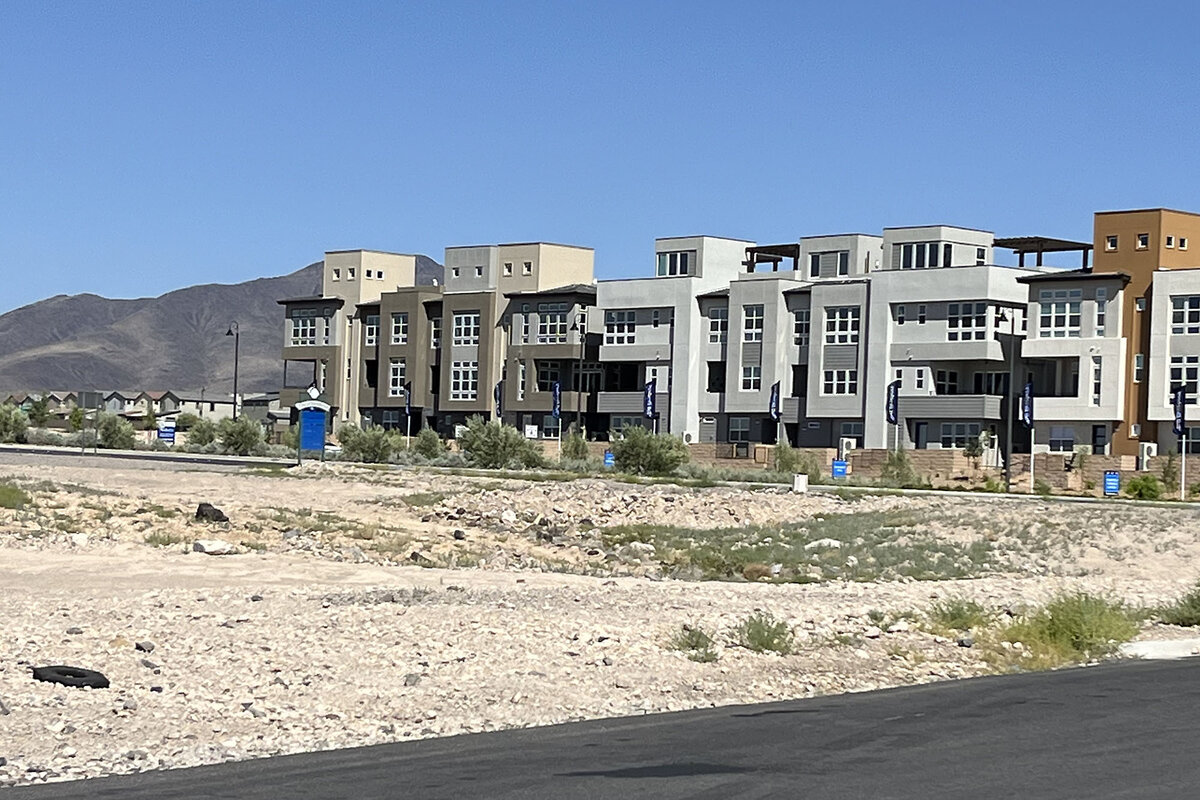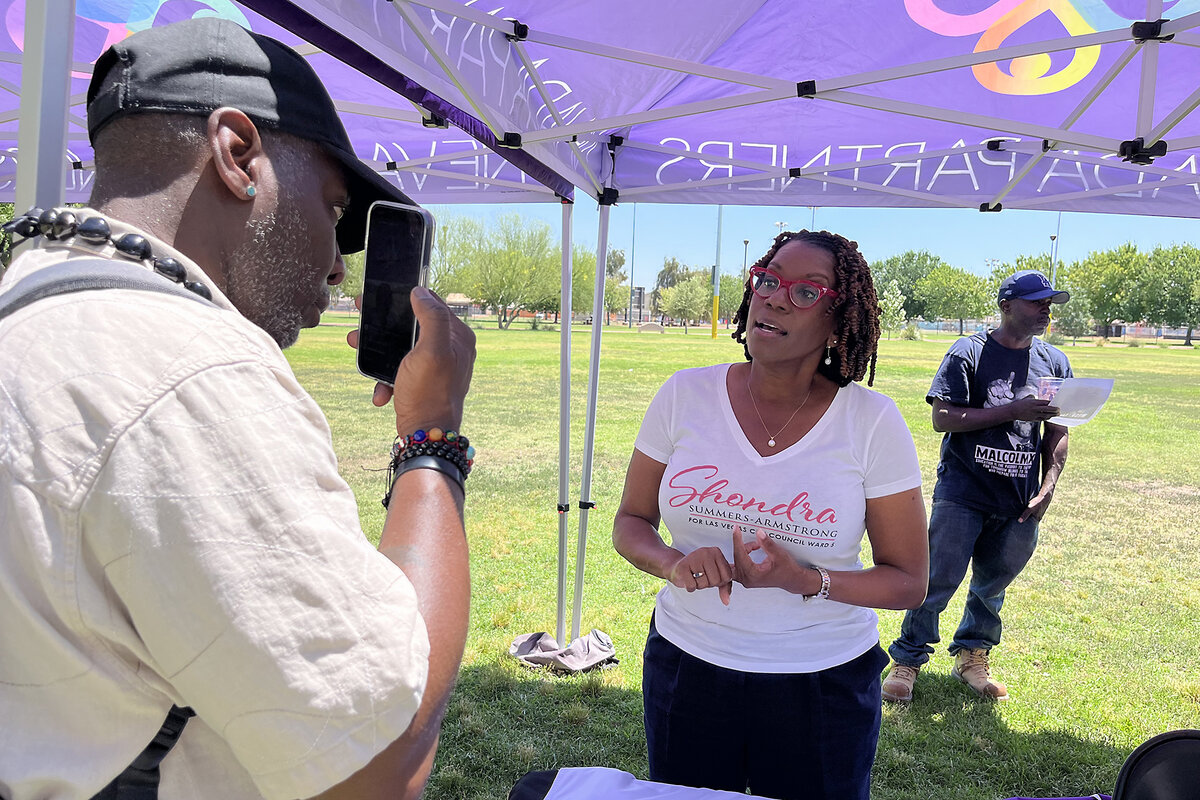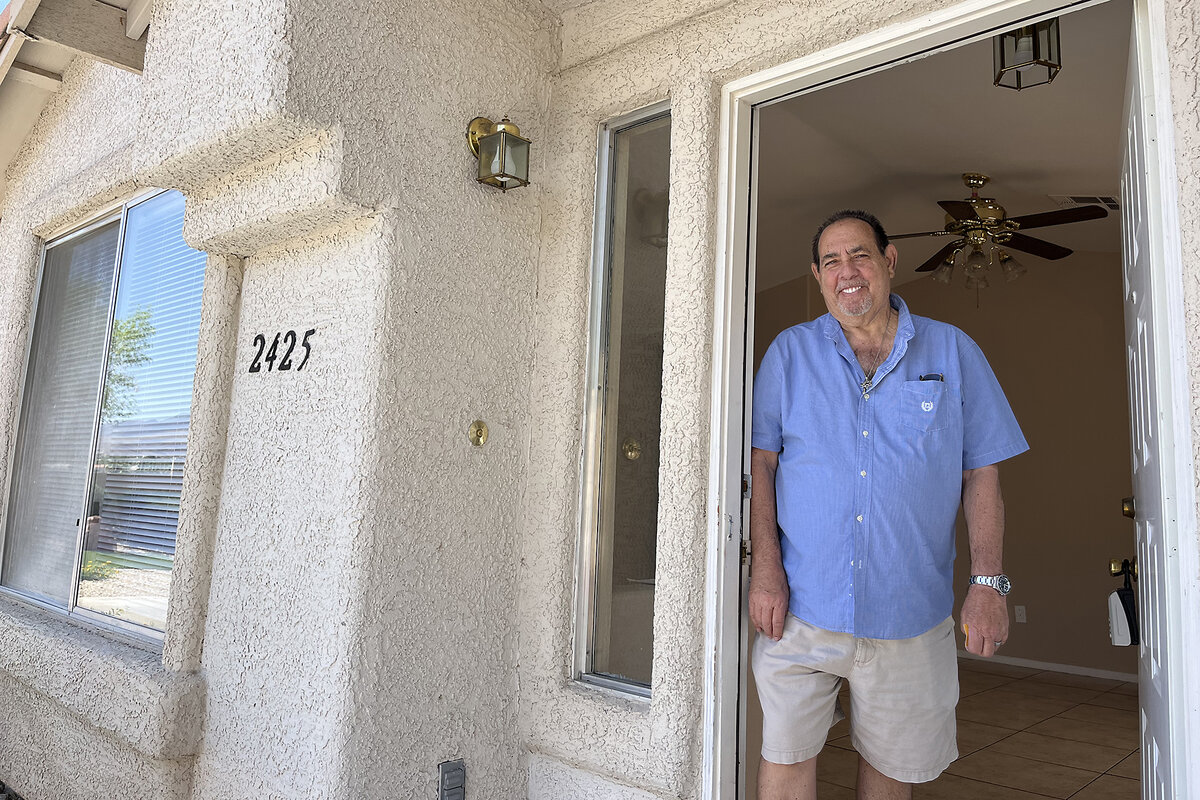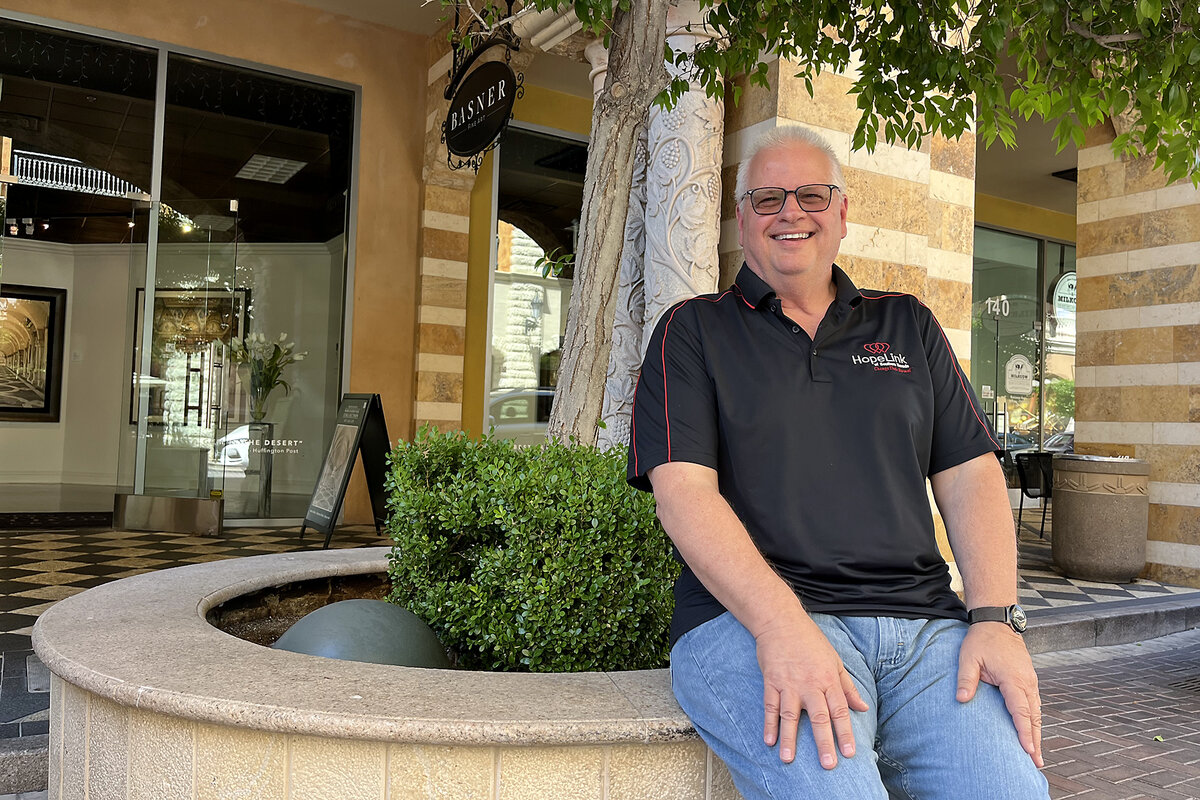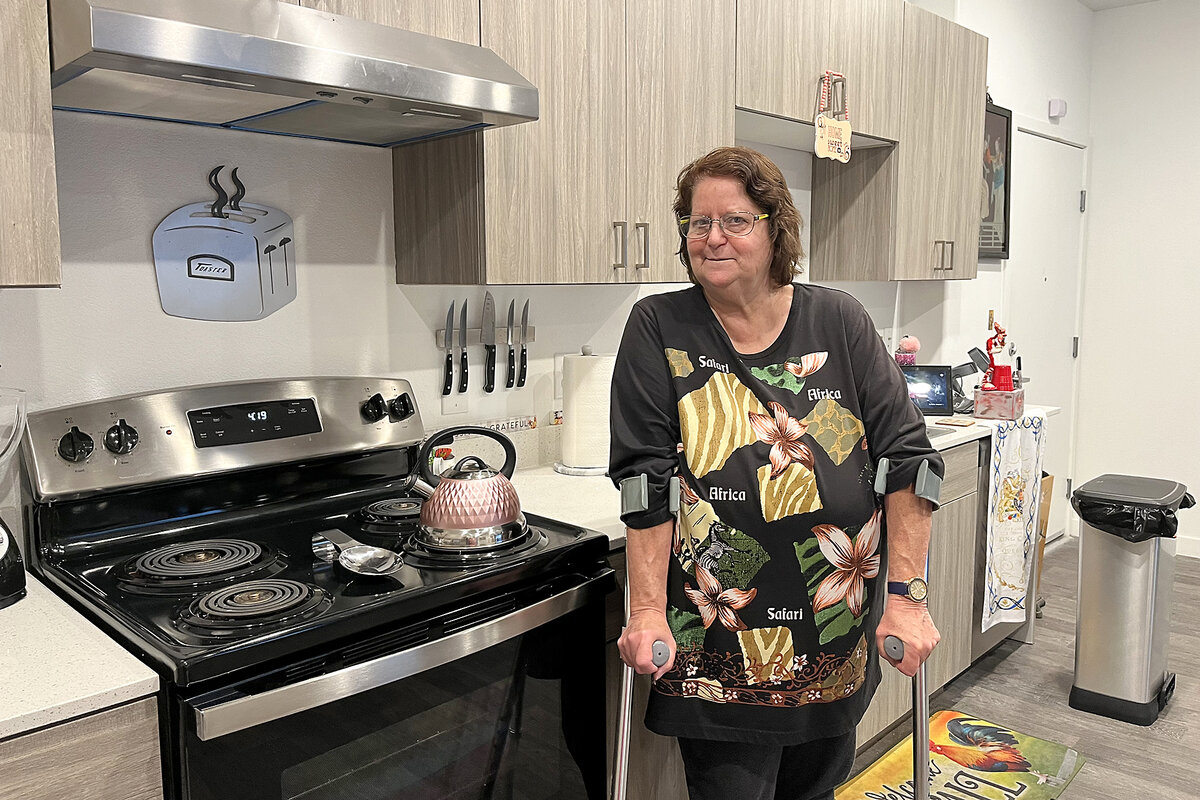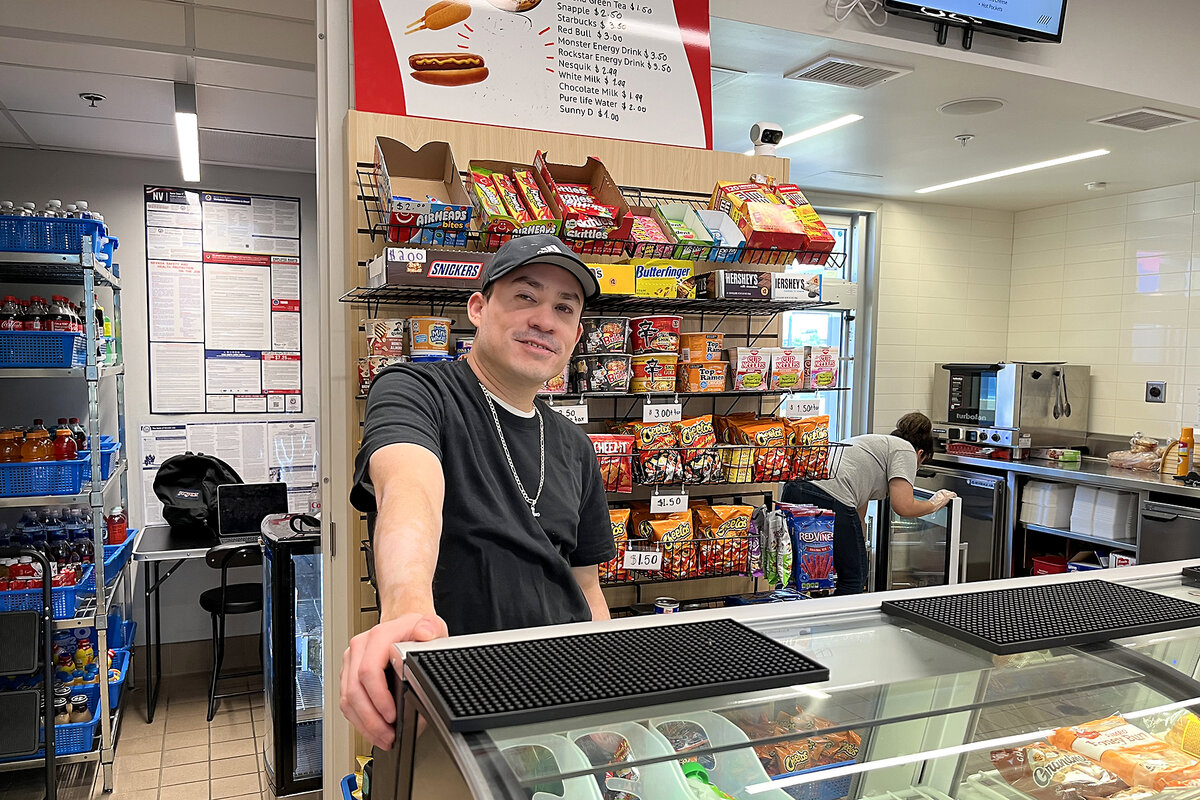In swing state Nevada, the vote may hinge on housing
Loading...
| Las Vegas
President Joe Biden is back in Nevada this week, and he’s talking about affordable housing – again. It’s high on the minds of voters, crucially in swing states like this one and next door in Arizona. Mr. Biden won both states in 2020; now they’re tilting toward former President Donald Trump.
“We’re going to make sure you own more and owe less,” Mr. Biden said in Las Vegas Tuesday, touting a plan that would impose a 5% cap on rent increases and eliminate student debt, among other initiatives.
Housing is a tricky one for presidents. Local officials tend to have much more sway than Washington does. And often, Congress needs to approve – as with the rent cap that the president mentioned. At the same time, affordable housing has been dubbed a “sleeper issue” in the presidential election.
Why We Wrote This
In Nevada, low housing stock and inflation woes could determine the presidential election. Part of a series on the issues that may tip key swing states: Arizona, Georgia, Michigan, North Carolina, Pennsylvania, and Wisconsin.
But that’s only if you haven’t been talking to voters, says David Byler, chief of research at the polling firm Noble Predictive Insights in Phoenix. “Housing affordability is a huge issue in Nevada – and it’s a huge issue across the nation.”
Housing woes, despite a strong economy
The problem is particularly acute here in the Silver State, where a growing population and shrinking housing inventory exacerbate the problem. The housing crunch may help answer the mystery of why voters still list “inflation” and “the economy” as top concerns, even though the inflation rate is about two-thirds lower than in 2022. The overall economy and jobs have also trended favorably, with both continuing to grow since their pandemic plunge.
But dive into the polls, and you hit a big rock of unaffordable housing. Inflation is a top response in almost every survey, says Mr. Byler, and “for a lot of people, inflation involved housing prices.”
In January, for instance, Pew Research Center reported that 72% of Americans are very concerned about the price of food and consumer goods; 64% said the same thing about housing – by far the largest expense in American household budgets.
Particularly illustrative is recent polling of Latino voters in Nevada, Arizona, and California.
While voters in all three states list the cost of living and inflation as the most important issue for the United States that elected officials should address, those in Nevada and California cite housing and rents as the biggest burden or financial hardship for them personally, according to an April poll by the Latino Community Foundation in San Francisco.
Latinos are an influential voting group, courted by both parties. In Nevada, they make up 22% of registered voters; in Arizona, it’s 25%; and in blue California – where they could decide some highly contested congressional districts – it’s 33%, according to Pew.
“This issue around housing, whether it’s affordable housing or rental housing, is very top of mind for the Latino electorate,” says Christian Arana, vice president at Latino Community Foundation. Candidates at all levels need to address it, he says.
On the ground in Las Vegas, state Assemblywoman Shondra Summers-Armstrong describes housing as part of a Venn diagram of overlapping issues. The Democrat is now running for City Council, and when she knocks on doors in her diverse ward, wealthy white voters tend to voice concerns about crime, she says. Black and Latino voters are squarely focused on the economy, with other issues mixed in.
“When you begin to pull the string, that comes to housing,” she says. Voters are wondering, “‘Is my money stretching enough for me to have housing that I feel safe in? If I can’t buy a house, because I don’t make enough money and am renting, at what point is my rent going to go so high that my income is not going to be able to allow me to live in a safe and clean neighborhood?’”
Economics 101: not enough supply
A three-bedroom, two-bath Spanish style house in the Las Vegas suburb of Henderson offers a lesson in economics – and, ultimately, politics.
At an open house in early June, it’s listed for $375,000 – well below the Las Vegas median listing of $460,000. But that’s still more than 2 1/2 times the price this same house sold for a decade ago.
A grandmother, daughter, and grandchild stop by to take a look around. It’s not very big for the price, the grandmother comments, though she has friends in the gated subdivision and loves the community. The one-story layout is spare, with an even smaller yard. The daughter says she can’t afford it anyway.
“Next week, it will be gone,” real estate agent Randall Bell predicts. In fact, it takes an additional week for a middle-aged couple with no children to scoop up the property. Mr. Bell and others say the problem here is simple: too much demand, not enough supply.
On the supply side, the housing shortage has been decades in the making. Much of it started with the Great Recession of 2007-2009, which put the brakes on homebuilding in states across the country, including in Nevada.
“We stopped building houses,” says Aaron Sheets, CEO of HopeLink of Southern Nevada, a nonprofit that works to prevent homelessness. “They were building 500 and 600 a year when we needed 5,000 a year.” Housing construction still has not caught up.
During this time, real estate investment firms also began gobbling up attractively priced housing nationwide, further distorting the market for would-be homeowners. In Clark County, which includes Las Vegas, about 15% of single-family homes are now owned by investors, according to the Lied Center for Real Estate at the University of Nevada, Las Vegas. Politicians complain that corporate investors have jacked up rents. The rent cap proposed by the president this week would apply to corporate landlords and require congressional approval.
Nevada Democratic Sen. Jacky Rosen wants the U.S. Department of Housing and Urban Development to investigate and crack down on predatory practices by investors.
“Buying up entire neighborhoods enables bad actor corporate investors to unreasonably raise rents without facing competition,” she wrote in a June letter to the department. The senator is running for reelection this November and has made affordable housing a key issue.
Nevada is also facing another squeeze. “We’re running out of land,” explains Mr. Bell, the real estate agent.
The federal government owns and manages 85% of land in Nevada. Although builders such as KB Home and Toll Brothers are marching new single-family homes and townhouses across the scrub desert on the outskirts of Las Vegas, they’ll eventually hit a limit. In as little as eight years, builders could run out of available land in the Las Vegas Valley, according to Tina Frias, CEO of the Southern Nevada Home Builders Association.
Demand soars – as do prices
On the demand side, Sun Belt states like Nevada have seen a huge influx of new residents pour into the state.
Some of these newcomers represent the fruits of a concerted effort to diversify the economy here, which has long been centered around gambling. Massive tax breaks around Reno in the north have lured companies like Tesla, Google, and Apple to the area, which boasts the nation’s largest industrial park. The state now has four professional sports teams – football, basketball, hockey, and baseball – and this year Las Vegas hosted the Super Bowl. The metro area’s population has more than doubled since 2000.
The COVID-19 pandemic only heightened the trend. Workers in high-cost, high-tax states like California and New York realized they could move somewhere cheaper and still work remotely, or retire and enjoy the benefits of the low-tax Silver State.
“A lot of my clients are from Los Angeles,” says Mr. Bell, the real estate agent. “They sell there, pay cash here, and put the rest in the bank. You can’t beat that.”
Mr. Bell himself is from the LA area, cashing out of a home he bought for $500,000 and sold for $1 million. He never would have been able to save that much, he explains, extolling the joys of Las Vegas living.
“It’s beautiful here. It’s quiet. There’s not as much traffic.” And, he insists, “it only gets hot three months of the year.”
But most Nevadans can’t afford what incoming Californians can. The average annual salary in California is $73,220; in Nevada, it’s $55,490. And with newcomers arriving and bidding up properties, prices for a single-family home in the Las Vegas Valley hit a record high in May.
Meanwhile, rents are also rising, and the state is short more than 78,000 affordable rental units, according to the National Low Income Housing Coalition. The figure is based on rentals available to people at or below the poverty guideline of 30% of median income for the area. A worker earning Nevada’s minimum wage of $12 an hour would have to put in 85 hours a week to afford a modest one-bedroom apartment at $1,329 a month.
Homelessness in Clark County, which includes Las Vegas, has more than doubled since the pandemic. Eviction filings are also up substantially. But the housing crisis in Nevada is “way broader” than homelessness, says Maurice Page, the executive director of the Nevada Housing Coalition.
“It’s really the working people,” he says, as he motors past the Strip and the cooks, room cleaners, and cashiers who work there. Las Vegas and the state are thriving, he says. But “there is going to come a point in time where businesses are not going to want to be with us because we don’t have enough housing.”
The politics of housing
None of this is going to get solved without political leadership. Mr. Page describes housing as a bipartisan issue that will require both parties to come together to address it.
Housing isn’t politically divisive in the way that other issues – like abortion or guns – can be. But while everyone may, in theory, agree that housing should be more widely accessible, there are sharply different ideas about the best policies to achieve this. And none of them are cost-free.
Democrats tend to back renter support, while Republicans typically push growth with fewer regulations. But there are also tensions within both parties’ coalitions. For every “yes in my backyard” activist urging politicians to change zoning laws and build more affordable housing in high-density places, there are middle-class homeowners – many of them older, or families living in the suburbs – who have a personal stake in protecting the value of the biggest asset they have.
In March, President Biden came to Las Vegas, devoting the core of his campaign speech to housing. He pointed out that the American Rescue Plan Act of 2021 – which no Republicans in the current Congress backed – helped keep millions of Americans, including many Nevadans, in their homes by providing billions of dollars in emergency rental assistance, alongside eviction and foreclosure moratoriums.
Funds from the Rescue Plan also helped a private company, the Ovation Development Corp., build a new complex of affordable apartments for older adults that opened in Las Vegas in December. Capriccio is a sparkling 195-unit building with granite countertops, stainless steel appliances, and communal amenities like a swimming pool and billiards. Now, resident Joy Walsh, an older adult who is disabled, says she can live in a safe, beautiful place and in the same building as her sister.
“Look at how I live!” she exclaims, and then announces that she wields a mean cue stick. “I’m the Capriccio pool champ!” Her only income is Social Security Disability Insurance.
As outlined in his State of the Union address, the president still wants Congress to pass a $258 billion housing plan. It would be the most consequential in 50 years, he told Nevadans. He’s proposing a $10,000 tax credit for first-time homebuyers and people who sell starter homes, expanded tax credits and incentives to build or renovate low-income and rental housing, and more rental assistance and rights.
The White House says the plan would help build or renovate more than 2 million homes at a time when the nation faces a shortfall of nearly 3 million housing units, as estimated by Moody’s Analytics’ chief economist, Mark Zandi.
“The bottom line to lower housing costs for good is to build, build, build,” the president said in Las Vegas in March.
Nevada Republicans are on board with the building part. But with space at a premium, they fault the White House for not moving fast enough to free up federal lands.
“The federal process for privatizing land for development is too slow, too complex, and contributes to higher costs for Nevada families seeking home ownership,” Republican Gov. Joe Lombardo wrote the president in March. This week, Mr. Biden announced in Las Vegas that he’s freeing up federal lands to allow up to 15,000 affordable housing units to be built in the state.
In April, the governor wrote the president again, excoriating him over the $1,445 increase in monthly payments on a median-priced Nevada home since he took office and blaming “excessive federal spending” for feeding inflation and the interest-rate squeeze.
Governor Lombardo backs a bipartisan bill in Congress sponsored by Rep. Susie Lee, a Nevada Democrat, that aims to cut red tape to access federal lands. At the same time, he has also vetoed several bills passed by the Democratic state legislature to bolster tenant and eviction protections, and further regulate rental fees.
In a campaign video, former President Trump has proposed a national contest to build 10 new cities the size of Washington on undeveloped federal land. He lambasts inflation and the Federal Reserve’s high interest rates – which, he says, have added to building and mortgage costs. He’s also criticized environmental regulations and zoning for increasing the cost of construction.
In another video, however, Mr. Trump criticizes President Biden and Democrats for supporting more flexible zoning laws to allow multifamily units in suburbs. “The woke left is waging full-scale war on the suburbs, and their Marxist crusade is coming for your neighborhood, your tax dollars, your public safety, and your home,” he warns. As president, Mr. Trump proposed deep cuts to affordable housing programs at the Department of Housing and Urban Development – but Congress threw up roadblocks.
Candidates need to focus on housing
Whether housing can drive voters to the polls is hard to tease out. But Republicans and Democrats need to spend much more time talking about it, say strategists. “I think both sides should be addressing this more,” says a GOP consultant who asked not to be named. “It will be the deciding issue, especially in the presidential.”
As part of the overall economic picture, it affects a “massive amount of voters,” says Mr. Byler, the pollster, though he cautions that it’s too early to say for sure which party it will favor.
Despite Mr. Biden’s repeated efforts at assistance and his detailed plan, voters may ultimately decide to punish the incumbent president for housing’s high cost.
“Most people agree, that if this election is decided on the economy, that it’s good for Republicans,” says the GOP consultant.
That seems to describe the voting intentions of Jason, a young man who runs a snack shop at the East Las Vegas Library, which doubles as a voting place. Unprompted, he says housing is his No. 1 issue. Every day, he sees the struggles of homeless individuals, who park themselves and their carts under the shade on the library plaza.
As for himself, Jason, who asked to use only his first name, bought a single-family home seven years ago and had been looking for another one – this time as an investment. But forget it. Home prices have rapidly increased, as have mortgage rates: Loan denied.
Disappointed, Jason says he’ll vote for Mr. Trump again. After all, he says, Mr. Trump is a businessman, like him.
Monitor staff writer Jackie Valley contributed to this story from Las Vegas.
This is one of a seven-part series on key swing states in the U.S. presidential election and the issues that may tip them. The full series includes articles reported from Arizona, Georgia, Michigan, Nevada, North Carolina, Pennsylvania, and Wisconsin.







